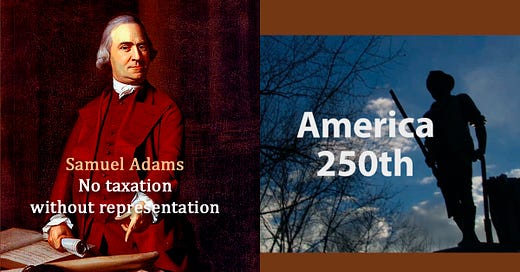America 250: No Taxation Without Representation
Why didn't America seek representation in Parliament?
Today, as we travel through the milestones of America’s 250th celebrations, we are doing so in the context of discovering waste and fraud in our current federal government.
The Department of Government Efficiency (DOGE) has uncovered thousands of affronts to American taxpayers. For example, DOGE found that the U.S. Treasury failed to include budget codes or had included invalid budget codes for $334 million in taxpayer dollars. No one knows where this money went. The Social Security administration listed 11 million wage earners who were age 120+. The wage earners are now labeled as they should be—deceased—and their payments stopped. These are just two countless problems that DOGE has found. The list goes on and on.
DOGE’s findings have outraged thousands and awakened the American people. Because we elect our government leaders, we have the right to demand accountability with our taxpayer money. This zeitgeist can help us better understand the underlying philosophy of our nation’s founding and America’s 250th—no taxation without representation.
The American Revolution sprang from the philosophy of no taxation without representation, especially through the work of Samuel Adams. King George III began to tax his 13 American colonies in the 1760s. British Americans were used to paying transportation costs for imported goods. They were not accustomed to paying a tax to the king on top of these shipping costs for sugar, glass, paint, lead and tea, to name a few. This tug of war over taxes became the American Revolution.
In this America 250 video, I explain the concept of no taxation without representation and ask this question: Why didn’t Parliament and King George give Americans representation in Parliament? Would that have worked and prevented a war?
For more videos, visit my rebooted YouTube channel. I've recorded several videos about the American Revolution for America's 250th. I could use subscribers and likes.




Congratulations! I’m rejoicing with you over this stellar new project.